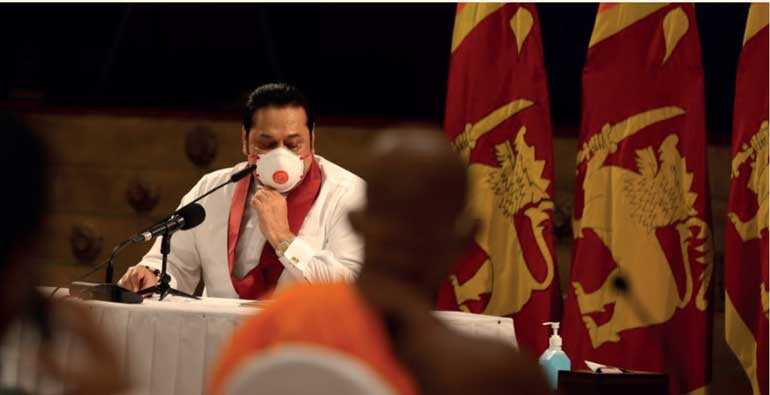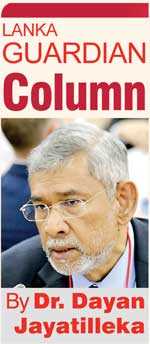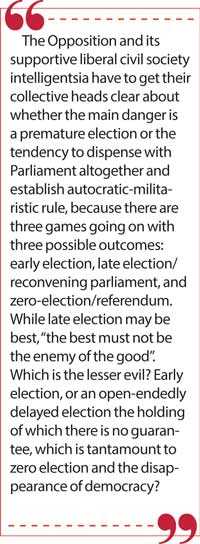Monday Feb 23, 2026
Monday Feb 23, 2026
Thursday, 7 May 2020 00:00 - - {{hitsCtrl.values.hits}}

While the coronavirus pandemic affects all countries it does so unevenly, with some being much more successful than others in containing and pushing back the attack. That unevenness is to do with the  policy responses of governments.
policy responses of governments.
Those who responded early enough and/or with the right policy mix, have been relatively successful, while others have not. Correct policy mixes depend on “right thinking”, adopting the right attitude and perspective, the right methodologies and protocols of thought. The absence of right attitude, right mentality, right perspective and right thinking, cannot but result in erroneous policies as well as policy and organisational practices.
Addressing the Nonaligned Movement’s special summit (videoconference), President Gotabaya Rajapaksa recounted “my Government’s” campaign against COVID-19, presenting it as an unmitigated success story and model for emulation: “…special and unique measures, establishment of quarantine centres under management of the armed forces, and the deployment of the intelligence services…”
No recognised international institution or publication, which lists, on the basis of facts and transparent objective criteria, diverse states such as Vietnam, South Korea and New Zealand as successes to be emulated, has made any such assessment of Sri Lanka’s performance.
More pertinently, while being guardedly positive, not a single authoritative Sri Lankan medical body has made such a lyrical assessment (while penetrating criticism and alarm have been expressed by Harvard-educated Dr. Ravi Ranan-Eliya).
As Andrew Cuomo, the globally admired and respected Governor of New York recently said, “you can’t argue with arithmetic”, quoting legendary Democratic Senator Daniel Patrick Moynihan’s line “You can have your own opinion, but you can’t have your own facts.”
The facts, the empirical evidence of graphs and figures, rates of spread and geographic proliferation including of lockdowns, and globally comparative percentages in proportion to population (relative instead of misleading absolute figures), show that it is time to reassess the model of the anti-corona campaign and make a mid-course correction.
Founding myths
The fundamental ideological construct runs along these lines: ‘We set a world record by winning the war against terrorism and being the first country and probably the only one to do so in the 21st century.  Having thus proven that we have the finest, most successful military in the world, we should and shall use the same personnel, institutions, mentality, model and tactics, and victory over COVID-19 shall be assured, because we are the greatest.’
Having thus proven that we have the finest, most successful military in the world, we should and shall use the same personnel, institutions, mentality, model and tactics, and victory over COVID-19 shall be assured, because we are the greatest.’
This doctrine is being applied to economic regeneration as well.
There were several large factual historical errors in that master-narrative of the Sinhala Alt-Right designed to project the image of a superior species above citizens and elected legislators: the military as Supermen; deities in society and social discourse.
Our magnificent victory over terrorism was quite exceptional and rare (“one of the few instances” as the Kerry-Lugar Report of late 2009 noted), but not “unique”, and it was not the first in the 21st century and new Millennium. There were two other victories in the 21st century which preceded Sri Lanka’s, ending wars that were of long duration and had a higher global profile than ours. Ours was the third. The first two wars are part of any standard textbook on armed conflicts and/or contemporary history/world politics because of the players involved.
Admirable as our military victory over the LTTE was, by the time we won in 2009 the Russian Army under President Putin had smashed the Chechen terrorist separatist militia and killed Shamil Basayev in 2006, Moscow’s troops were already withdrawing from Chechnya, elections had been held and an ally was governing the region. The Chechen separatist militia had fielded the dreaded Black Widow women suicide-bombers and Islamist jihadist foreign fighters, mainly Arabs, from the world over.
Years earlier, in 2002, the 27-year-old Angolan civil war was won by the leftwing MPLA Government when its ex-guerrilla liberation army (famously trained and supported by Castro’s Cuba) pumped 15 shots into Jonas Savimbi, the leader of UNITA which had received training and weapons from the USA, China and South Africa since the 1970s.
In these countries, the campaign against the coronavirus is not led by the armed forces.
In none of the countries including the developed (e.g. New Zealand) acclaimed as successes in the anti-corona campaign does the military lead or drive the effort (though Israel’s Shin-Bet, not Mossad, initiated digital tracking).
Vietnam model: PM leads
Perhaps the best example of the ability to separate out military achievement from a medical challenge, comes from Vietnam. No country in our lifetime has a more historic military achievement than Vietnam, which defeated the Japanese, the French and most importantly the Americans.
In the anti-corona campaign, the Vietnamese state reminded the people of the spirit of the victorious national liberation war against imperialism and urged that it be rekindled. And yet, as is transparent from all news reports including from official Vietnamese sources, the highly successful anti-corona campaign is not headed by its army chief, the military is not omni-present, and certainly not seen in public spaces with guns in hand. It doesn’t even make the news commentaries. Front and centre are the medical personnel and health officials led by the Health Ministry, the Deputy PM, and above all the Prime Minister himself.
“…After a full week of no new reported patients, Vietnamese Prime Minister Nguyen Xuan Phuc decided to end his Directive No. 16 on the enforcement of social distancing over the whole country. …Vietnam can be considered at a disadvantage with a smaller economy, a larger population, and a long and somewhat porous border with China...The Ministry of Health and its network of centres of disease control and prevention all over the country, despite their patchy leadership and limited resources, have proven to be instrumental in the government’s effort to contain COVID-19…
… Prime Minister Phuc surely understood that, no matter how extensive his security apparatus...it would be unwise to try to hide the actual situation of the pandemic from the people instead of being upfront and proactive like Phuc has been for the past three months.
… It is reasonable for other nations currently struggling with high infection and mortality rates of the deadly virus to learn from Vietnam and replicate its prevention measures…The accountability of senior officials at both central and local levels, and transparency in communicating strict and often difficult measures like social distancing and quarantine will always be of paramount importance to the fight against coronavirus, or any infectious disease in the future.”
(https://thediplomat.com/2020/04/the-domestic-politics-of-vietnams-coronavirus-fight/)
Note also that in stark contradistinction to the rejection of open economic policies and conversion to economic nationalism that Sri Lankan Government discourse has sunk to, the Vietnamese Communist leadership reiterated its explicit commitment precisely to “open economic policies”, albeit re-balancing COVID-19 suppression and economic revival: “Vietnamese Deputy Prime Minister and Minister of  Foreign Affairs Pham Binh Minh proposed pursuing a balanced approach in fighting the epidemic and maintaining open economic policies…” (https://thediplomat.com/2020/04/the-secret-to-vietnams-covid-19-response-success/)
Foreign Affairs Pham Binh Minh proposed pursuing a balanced approach in fighting the epidemic and maintaining open economic policies…” (https://thediplomat.com/2020/04/the-secret-to-vietnams-covid-19-response-success/)
While Vietnam has a Presidential system as does Sri Lanka, the report emphasises that in Vietnam it is “…The Prime Minister, who has become the face of the fight against COVID-19…” (Ibid)
Why is this not the case in Sri Lanka, where the Prime Minister, a long time Minister, three-time Prime Minister including during the tsunami, and more importantly a two-term President including in wartime, is one of the most experienced political, state and governmental leaders in Asia, not just South Asia?
Though our Army Commander and Secretary of Defence are fine commanding officers, they cannot be expected to have Prime Minister Mahinda Rajapaksa’s matchless understanding of the workings of the State system and mastery of managing the Governmental and State machinery and public opinion as an ensemble, as a whole, including during exceptional and extreme situations.
Boycotting Track B
The Opposition jointly signed a letter to the President urging the reconvening of Parliament through one of two pathways. It was a good opening move, provided it was meant as the first step in opening a negotiation, rather than something of an ultimatum. The underlying flawed assumption that it is a seller’s market, when it’s not. The very next day Mangala Samaraweera followed up with his own letter, the bottom line (literally) of which was a threat addressed to the President and the Prime Minister that they were in danger of losing their civic rights as well as their movable and immovable properties if they did not immediately reconvene Parliament. Whether the provocation was inadvertent folly or intended to polarise, one cannot know. The President’s response, through Dr. P.B. Jayasundera, was typical and predictable. What happened next was a textbook blunder. The Opposition decided to boycott Prime Minister Mahinda Rajapaksa’s invitation to a conclave of all ex-MPs, at Temple Trees. A most laudable exception was the TNA with its civility and constructive participation backed up with a pointedly critical public statement. The old Parliament refused to appoint Mahinda Rajapaksa, the war-winning President and leader of the largest number of non-government MPs by far, as the Leader of the Opposition, but Mahinda Rajapaksa, now PM, invited the same politicians as former legislator-colleagues, to his official residence Temple Trees, which gesture they ungraciously spurned. This raises the moral question which John Le Carre expressed through his unlikely hero George Smiley at the tail-end of ‘Call for the Dead’: ‘“Oh God” said Smiley aloud, “who was then the gentleman?”’
Considerations of civility apart, if a hegemonic player closes Track A, you welcome anyone who opens a potential Track B. When serious state actors find that Trump has slammed the door in their face while the Europeans have invited them to dialogue, they seize the opportunity despite the obvious fact that the Europeans are allies of the US. When the hawks are unresponsive, you talk to the doves and the owls, especially if you have been invited by them.
Rational realism dictates that you may find yourself shut out, but you never shut yourself out. You must never “self-quarantine” from the political mainstream. You never shut a window of opportunity for political dialogue. You use every chance to turn a tangential encounter into an opening and an opening into a process. Above all, you adhere to a strategy of presence and visibility, never foreclosing even a millimetre of political space that you might be afforded for political conversation and intervention, constructive engagement and participation. By turning its back on this opening of a civilian political space by the PM, affording a counterpoint of political contact and conversation between democratic ex-parliamentarians of all stripes, the myopic Opposition has weakened the pragmatists and reinforced the ‘Military First’ hardliners, thereby strengthening the dynamics of political polarisation at the worst moment for the country. An invitation to dialogue from the Prime Minister—any Prime Minister—should be treated with respect, by virtue of that office. In the case of Mahinda Rajapaksa, we are dealing with a war-winning two-term President and an elder statesman in the region. The rejection on relatively flimsy grounds, of a goodwill gesture of outreach from a heroic, even historic personality who is also a much-loved and respected father figure (arguably a second D.S. Senanayake for wartime and postwar generations of Sinhalese) may not play particularly well in the Sinhala heartland.
Opposition’s only option
The Opposition and its supportive liberal civil society intelligentsia have to get their collective heads clear about whether the main danger is a premature election or the tendency to dispense with Parliament altogether and establish autocratic-militaristic rule, because there are three games going on with three possible outcomes: early election, late election/reconvening parliament, and zero-election/referendum. While late election may be best, “the best must not be the enemy of the good”. Which is the lesser evil? Early election, or an open-endedly delayed election the holding of which there is no guarantee, which is tantamount to zero election and the disappearance of democracy? (And is Mahinda Deshapriya better or worse than an outright proxy?)
If the danger of Alt-Right neo-totalitarianism is the most evil, then the Opposition shouldn’t set its face against any election however untimely, which reboots Parliament. If it does so, then logically it does not regard the ongoing tectonic ‘power shift’ from civilian to military, spawning a military-centric state and ethos, an overriding cause for concern.
The Opposition must decide whether it wants a functioning Parliament as platform and counterweight, or only the previous tainted (Bond scam-to-Easter negligence) Parliament reconvened. If the former, then a new Parliament should do the job and elections should be warily welcomed. If the latter, due to zealous fidelity to constitutional propriety, then a challenge in Court is the way to go while simultaneously engaging in political dialogue with any legitimate power-centre. The hallucination is that the moment of “high liberal-constitutionalism” of late 2018 can be revived. But we’ve been there, done that, got 250+ coffins to show for it, and won’t go back again. President Sirisena resorted to dissolution as did President CBK in 2003, to halt a rapid deterioration of the State, but with that decision overturned and the Wickremesinghe-Samaraweera dispensation restored, the neglect and marginalisation of security and intelligence resumed, and we were left wide open to the Easter bombers. Today we are looking at the post-19th amendment Constitution not in its pristine untested form, but in the rearview mirror of calamitous historical experience.
Though the most important first step of a new formation with a youthful leadership has been taken, the Opposition as a whole has yet to escape the force-field of the last quarter-century of Ranilian retrogression. Hooked on ‘virtual’ liberal-constitutionalism, unaccustomed to (JRJ-Premadasa) realist strategic calculus and instinctive grasp of the ratio of forces, unfamiliar with asymmetric unconventional battle, unrehearsed in ‘taking the shot’ when evanescent political opportunity arises, and unprepared for mobile, multi-vector manoeuvre on the rugged, uneven terrain of political actuality, the Opposition lapses into “frontal attack in a period in which it only leads to defeats” (Gramsci). The Opposition must mass-produce the only successful ‘vaccine’ against the regime’s guiding/cementing ideology of xenophobic ultra-nationalism. The doctrine’s Godfather, Dr. Gunadasa Amarasekara, revealed the identity of the real antipode of ultra-nationalism, constituting that potential ‘antibody’, in an origin story featured this Monday in an English-language daily (translated from the Sinhala):
“In 1987 I brought out a publication ‘Jathika Chinthanaya saha Jathika Arthikaya’. I wrote it as a response to Ranasinghe Premadasa’s challenge; his patchwork remedial welfare measures were not effective in curing the ills …” (‘Lesson from Corona’, 4 May)
In that opening ideological and ‘culture war’ (1987-1993) until Premadasa’s assassination, Jathika Chinthanaya was massively defeated by the Premadasa paradigm. With the Ranilist retrenchment from Premadasism to neoliberalism, ‘Jathika Chinthana’ ultra-nationalism attained ascendancy, and now, in its weaponised ‘Military First’ model, is the ruling doctrine.
Can the Opposition reload the Premadasa paradigm while privileging key players who were violently, destructively, anti-Premadasa/Premadasism?
The progressive New Opposition that emerges from beneath the “lawnmower” of an election, led by a youthful, moderate, patriotic social democrat, will hopefully make up in quality what voters would have culled in terms of quantity.